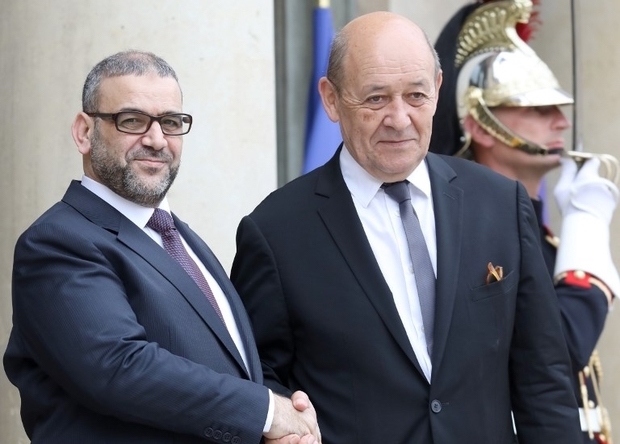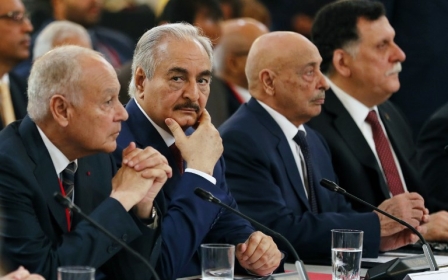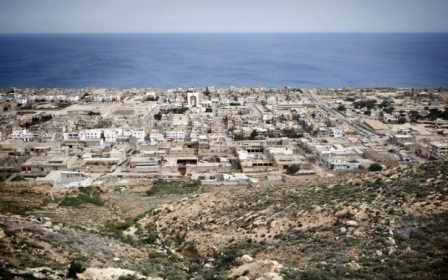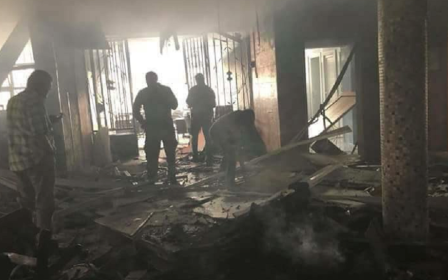Haftar 'will face many challenges' in elections: Libya's state council head

Libyans will have a constitution and elections by the end of the year and, once the vote is held, political leaders must be prepared to accept the results, the head of Libya's top advisory council has told Middle East Eye.
"We will accept the outcome of the elections, no matter who is elected," said Khaled al-Mishri, head of the High State Council.
"Any concerns we have will be brought up before the elections take place ... if any nominee passes the conditions required to take part in elections, then we will accept it should they win."
Elected to lead the council in April, Mishri, 51, was previously a member of the General National Congress, and the chair of its finance committee. Mishri represents the Muslim Brotherhood's Justice and Construction Party in Libya, which was founded in March 2012.
Fresh from a meeting in France last month in which rival factions agreed to the elections, Mishri spoke with MEE about what happened behind closed doors in Paris and how he thinks the elections will unfold.
Libya has been riddled with instability since February 2011 when protests led to the toppling of long-time ruler Muammar Gaddafi.
Since then, rival militias have clashed over territory and resources leaving the country with two competing governments each vying for more control.
The Paris meeting, hosted by French President Emmanuel Macron, brought together four leaders – Mishri; Fayez al-Sarraj, the United Nations-backed prime minister in Tripoli; Khalifa Haftar, the military leader who controls territory in the east of the country; and parliamentary speaker Aquila Saleh - who represent most, although not all, of Libya's rival factions.
Mishri said simply getting everyone around the table was a great achievement. Beyond that, the parties agreed in an eight-point joint statement to finalise the basis of a constitution by 16 September and hold elections on 10 December.
They also agreed to phase out parallel institutions and unify the Libyan Central Bank.
"France should be thanked for this great effort. This was a much-needed agreement," he told MEE.
Elections 'least harmful option'
Analysts have expressed doubts that the Paris statement, which wasn't signed but was agreed verbally, will actually lead to elections. Others, like Human Rights Watch, have warned against rushing the elections, saying that authorities cannot guarantee freedom of assembly or free speech essential for a vote.
At least 12 people were killed in an attack on the offices of the Libyan electoral commission in Tripoli last month.
"Libya today couldn't be further away from respect for the rule of law and human rights, let alone from acceptable conditions for free elections," said Eric Goldstein, deputy Middle East and North Africa director for the rights group.
"The authorities need to be able to guarantee freedom of assembly, association and speech to anyone participating in the elections," he said in a statement.
But Mishri said the elections cannot be delayed, all responsible parties will be held to account for delays, and he's confident that both a referendum on the constitution and elections will move forward this year.
"We are choosing the least harmful of two options: the harm that will come from staying as we are, and the harm of going ahead with presidential and parliamentary elections without a constitution. I think the latter - going ahead without a constitution but based on constitutional foundations - will be less harmful than carrying on with the situation as it is," he said.
"If, for one reason or another, the referendum law could not be implemented, we cannot allow Libyan society to be held hostage by these bodies that are in place now."
He added: "We have outlined in the statement that Libyan official security forces will look to ensure the safety of the election process and the freedom of Libyans to express their will, with support from the United Nations and the international community."
Haftar to face 'legal challenges'
In 2014, Haftar declared a coup in the country. Aligned with the eastern-based House of Representatives, which opposes the UN-backed Government of National Accord (GNA) in Tripoli, he has repeatedly issued threats that his forces would take over Tripoli.
He also enjoys support from Egypt, the UAE, Russia and France, which has provided him with military support including deploying advisers and special forces to the east of the country.
So there are concerns that should Haftar be elected in the upcoming vote, particularly without a binding constitution, he could declare a complete takeover again, but this time with the legitimacy of having been elected.
But Mishri said that, with the right legal mechanisms in place, these concerns, while real, can be managed.
"These fears are all legitimate," Mishri said. "However, our only options are carrying on as we are or going ahead with elections based on the draft constitution.
"We can use the same constitutional foundations in the draft document, and so elections will be guided by a constitutional basis. We can't say that these elections will be without a constitutional framework."
For all this concern, he said he is not sure Haftar will make it through the hoops to become a presidential candidate.
"I am certain that many players, possibly Haftar, will be subject to many legal challenges. These wars waged, and concerns raised by human rights groups ... I am sure there will be many challenges," Mishri said.
"But even if he does get through to the election phase, the opposition to him and what he has done is so widespread that it would be difficult for him to win."
Haftar and his forces have been accused of war crimes for operations carried out in the east of the country in areas under their control.
An ICC warrant was issued in September last year for a member of an elite force of Haftar's so-called Libyan National Army (LNA), and calls for him to be handed over to the court have been repeatedly ignored.
When asked about whether crimes committed by Haftar are considered important to them moving forward, he said: "We will always be thinking about the issue of spilled Libyan blood, and the lives of Libyan citizens. We must stop the bloodshed, and allow Libyan to live a dignified life."
While the meeting took place in Paris, forces loyal to Haftar continued their assault on Derna, a city in the east of the country that they have had under siege since 2016, with around 150,000 residents caught in the crossfire.
Queues for banknotes
Libya's economy has deteriorated rapidly in recent years as conflict and anarchy have hit oil exports that provide nearly all its income. People queue to get banknotes which are in short supply while living standards plummet and prices surge.
And it will be the leading issue in the upcoming elections, he predicted.
"Libyans want economic stability," Mishri said.
According to the World Bank, the Libyan economy shrank by an estimated 2.5 percent in 2016, with estimated real GDP falling to less than half of its pre-revolution level.
"The problem began when the Benghazi bank was set up in the eastern city of Bayda," Mishri said.
"This bank brought a new currency, a currency without official approval, and the currency, which is essentially a counterfeit currency as it was not issued officially - it was used to buy dollars and as trading with it grew the problems grew, and here we are."
Authorities in the east circulated their own currency, made in Russia. The bank headquarters in Tripoli has in the past criticised the issuance of bank notes in the east.
"We cannot gamble with the future of Libya because some people are opposed to going ahead with elections," Mishri said.
Middle East Eye propose une couverture et une analyse indépendantes et incomparables du Moyen-Orient, de l’Afrique du Nord et d’autres régions du monde. Pour en savoir plus sur la reprise de ce contenu et les frais qui s’appliquent, veuillez remplir ce formulaire [en anglais]. Pour en savoir plus sur MEE, cliquez ici [en anglais].




